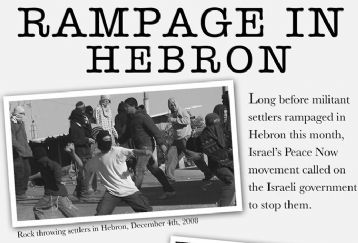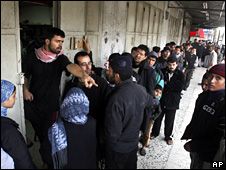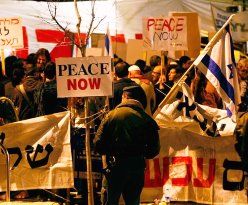January 2009 Archives
JTA: The Global News Service of the Jewish People
http://jta.org/news/article/2009/01/25/1002499/op-ed-two-states-only-solution-to-gaza-lifeline
Op-Ed: Two states the only hope for Gaza normalcy
By Ori Nir · January 25, 2009
WASHINGTON (JTA) -- Last week I dug up an old, yellowing Israeli intelligence report from April 1987 headlined "The Gaza Strip toward the year 2000." It was authored by the "Civil Administration," Israel's military government, only several months before the eruption in Gaza of the first intifada.
The secret document, distributed to Israel's top security leadership, provides both a high-resolution snapshot (more than 200 pages) of Gaza and a careful forecast. Amazingly, it predicted a process of multifaceted integration of the Gaza Strip into Israel.
Reading the report, written less than 22 years ago, is like a voyage to ancient history. What the report clearly shows, however, is that policy mistakes and misunderstandings about Gaza are as old as Israel's 41-year-old occupation of the strip.
The population of Gaza in 1987 was 633,600. Today it has climbed to more than 1.5 million. The report predicted that by the year 2000, the strip's population would reach 1 million -- a "maximal forecast" depicted as "unreasonable," meaning unreasonably high. In fact, by 2000, the strip's population had mushroomed to 1.132 million. The fertility rate for 2000 was predicted to drop from 6.60 to 5.80, but it remained at 6.55 and was estimated at 5.19 in 2008.
The report did talk, casually , about the "increase in the strength" of the fundamentalist Islamist political stream, but noted that although the Islamists support Israel's destruction, they believe that their first focus ought to be "preparing the hearts and minds" within their community.
Around that time, as a reporter covering Palestinian affairs, I met with the Israeli governor of Gaza, who told me that Israel had "no problem" with the Islamists because they were not engaged in any subversive or violent activity. To the contrary: Israel's military government in Gaza, dividing and ruling as it always did, gently nurtured the Islamists as a counterweight to the Palestinian Liberation Organization during the 1980s.
The most fascinating -- and today fantastical -- chapter in the report is the one examining the social trends in the strip. It predicted the accelerated socio-political integration of the Gaza Strip into Israel, as well as "an increase in reciprocal dependency between the Gaza Strip and Israel." It predicted the "penetration of the Strip's employees into high-level professions in Israel," and even Gazans' "imitation of the Israeli life style."
So much for that. The Palestinians of Gaza rebelled against Israel's occupation months after the report was issued and have been fighting for independence for more than two decades.
The Palestinians of Gaza, just like their brethren in the West Bank, need and deserve political independence. But the Gaza Strip simply cannot live in political or economic isolation. The 22-year-old Israeli report is clear about that. Its message is that the Gaza Strip has no viability, no future, as an isolated, detached entity.
At the time there was no fence between Israel and Gaza, not even a roadblock or a checkpoint at the entrance to the strip. Today it is impossible to imagine open borders between Israel and Gaza.
Israel will not become again an economic lifeline for Gaza in the foreseeable future. Neither will Egypt, its southern neighbor. Both Israel and Egypt see Gaza as nothing but trouble.
The only real viable hope for Gaza is a link to the other Palestinian territory, the West Bank. Only a strong relationship with the West Bank, reinforced by unhindered safe passage between the two Palestinian territories, can provide the remedy for Gaza. In other words, the only real hope for Gaza lies in the two-state solution.
Israelis and Palestinians must keep in mind that a cease-fire is not an alternative to peace. Israelis and Palestinians, and the international third parties that help them advance toward peace, must remember that just as a two-state solution is the only way in which Israel can secure its long-term character as a Jewish and democratic state, so does the two-state solution provide the only hope for Gaza to reach a reasonable level of normalcy and sustainability in the long run. Only a two-state solution can provide the uninterrupted, robust lifeline to the West Bank that the Gaza Strip needs.
The war and the cease-fire that followed show yet again that only a two-state solution provides a horizon of hope for Israelis and Palestinians to reach the peace and long-term security that they so much deserve.
(Ori Nir, formerly the Palestinian Affairs correspondent for the Israeli daily Ha'aretz, is the spokesman for Americans for Peace Now, a Zionist Jewish organization supporting Peace Now, Israel's largest peace movement.)

Having recently read David Grossman's wonderful book on the biblical story of Samson, I think the lead of this piece is brilliant. One may disagree with Grossman's conclusion that Israel must speak to Hamas. But his fundamental point is so simple and so correct, so profound: Israel cannot and must not address the Palestinians only by force. It must always remember that its ultimate goal is to live in peace with its neighbors.
This piece, in tomorrow's Haaretz, is really worth reading.
===========
http://www.haaretz.com/hasen/spages/1056955.html
20/01/2009
David Grossman / Israel's success in Gaza only proves it is strong, not right
By David Grossman
Like the pairs of foxes in the biblical story of Samson, tied together by their tails, a flaming torch
between them, so Israel and the Palestinians - despite the imbalance of power - drag each other along. Even when we
try hard to wrest ourselves free, we burn those who are tethered to us - our double, our misfortune - as well as
ourselves.
And so, amidst the wave of nationalist hyperbole now sweeping the nation, it would not hurt to recall that in the final analysis, this last operation in Gaza is just another stop along a trail blazing with fire, violence and hatred.
As satisfied as Israelis are that the technical weaknesses of the Second Lebanon War were corrected, we should be paying heed to another voice - the one that says the Israel Defense Forces' successes in the confrontation with Hamas do not prove that it was right to embark on such a massive campaign, and are certainly no justification for Israel's mode of operation in the course of the fighting. These military successes merely confirm that Israel is stronger than Hamas, and that under certain conditions it can be tough and cruel in its own way.
When the guns become completely silent, and the full scope of the killing and destruction becomes known, to the point where even the most self-righteous and sophisticated of the Israeli psyche's defense mechanisms are overcome, perhaps then some kind of lesson will imprint itself on our brain. Perhaps then we will finally understand how deeply and fundamentally wrong our actions in this region have been from time immemorial - how misguided, unethical, unwise and above all, responsible, time after time, for fanning the flames that consume us.
Obviously, the Palestinians cannot be let off the hook for their crimes and mistakes. That would be tantamount to belittling and condescending to them, as if they were not mature adults with minds of their own, responsible for their own decisions and failures. The inhabitants of the Gaza Strip may have been "strangulated" in many ways by Israel, but even they have other options for protesting and drawing attention to their misery than the launching of thousands of rockets against innocent citizens in Israel.
We must not forget that. We cannot pardon the Palestinians or treat them forgivingly, as if it were obvious that whenever they feel put upon, violence will always be their sole response, the one they embrace almost automatically.
Yet even when the Palestinians act with indiscriminate violence, when they use suicide bombings and Qassam rocket fire, Israel is stronger than them, and it can have a tremendous impact on the level of violence in the conflict as a whole - and hence on calming it down and even bringing it to an end. The current confrontation has not shown that anyone in the Israeli leadership really grasps the critical significance of this aspect of the conflict in any fully conscious or responsible way.
One day, after all, we will seek to heal the wounds we inflict today. How will that day ever come if we do not understand that our military might cannot be the primary instrument for carving out a path for ourselves in this region? How will that day ever come if we fail to comprehend just how graveness is the responsibility that lies on our shoulders by dint of our complex and fateful relations, both past and future, with the Palestinians in the West Bank, the Gaza Strip and the Galilee?
When the clouds of colored smoke dissipate from the politicians' claims of sweeping and decisive victory; when we discover the actual achievements of this operation, and how far they are from what we really need in order to live a normal life here; when we finally admit that a whole country eagerly hypnotized itself, because it needed so badly to believe that Gaza would cure it of Lebanon-itis - maybe then we will settle accounts with those who, time after time, incite the Israeli public, whipping them into a frenzy of arrogance and a euphoria of power. Those who have taught us over the years to scoff at belief in peace and any hope for change in our relations with the Arabs. Those who have convinced us that the Arabs understand only force, and therefore that is the only language we can use in our dealings with them.
And because we have spoken to them for so long in that language, and that language alone, we have forgotten that there are other languages for speaking to human beings, even to enemies, even bitter foes like Hamas - languages that are as much our mother tongue as the language of planes and tanks.
We must speak to the Palestinians: That is the most important conclusion from the most recent round of bloodshed. We must speak also to those who do not recognize our right to exist here. Instead of ignoring Hamas at this time, we would do better to take advantage of the new reality that has been created by beginning a dialogue with them immediately, one that would allow us to reach an accord with the whole of the Palestinian people. We must speak to them and begin to acknowledge that reality is not one hermetic story that we, and the Palestinians, too, have been telling ourselves for generations. Reality is not just the story we are locked into, a story made up, in no small measure, of fantasies, wishful thinking and nightmares.
We must speak to them, and create, within this closed-off, deaf reality, the very possibility for speech. We must create this alternative, so mocked and maligned today, which in the tempest of war has almost no place, no hope, no believers.
We must speak to them as part of a calculated strategy. We must initiate speech, insist on speech, let no one put us off. We must speak, even if dialogue seems hopeless from the start. In the long run, this stubbornness will contribute much more to our security than hundreds of planes dropping bombs on a city and its inhabitants.
We must speak out of understanding, born as we look out at the horrible devastation, as we grasp that the harm we are capable of inflicting on each other, each people in its own way, is so enormous and so destructive and so utterly senseless, that if we surrender to it and accept its logic, it will end up destroying us all.
We must speak, because what has happened in the Gaza Strip over the last few weeks sets up a mirror in which we in Israel see the reflection of our own face - a face that, if we were looking in from the outside or saw it on another people - would leave us aghast. We would see that our victory is not a genuine victory, and that the war in Gaza has not healed the spot that so badly needs a cure, but only further exposed the tragic and never-ending mistakes we have made in navigating our way.
 William Corcoran - President of the American Near East Refugee Aid
William Corcoran - President of the American Near East Refugee Aid

Today's edition of the International Herald Tribune includes an important op-ed by Yossi Alpher, entitled "Now Stop Starving the Gazans."
Excerpt:
"For the past year and a half, Israel, with the full backing and encouragement of the quartet of Middle East mediators (the European Union, the United States, the United Nations and Russia), as well as Egypt, Saudi Arabia and even the West Bank-based PLO, has maintained an economic blockade on the Gaza Strip.
"Generally it has allowed into Gaza only the equivalent of the UN minimum number of calories required daily for subsistence, multiplied by the 1.5 million or so population of the Gaza Strip, along with minimal medical supplies and fuel.
"This economic-warfare strategy against Gaza has failed totally; indeed, it has proven counterproductive...
[snip]
"Arguably, the current military campaign might have been avoided had the economic war ended. Even if the Israeli bombing and invasion were unavoidable, open land crossings between Gaza and Israel would have allowed Gazans to stock up with emergency provisions rather than be caught by this war with empty shelves, thereby avoiding at least part of the current humanitarian crisis..."






Last week, representatives of two leading Israeli human rights organizations - Tania Hary from Gisha, and Ran Yaron from Physicians for Human Rights-Israel - made a last-minute, whirlwind trip to Washington. Their goal was to try to convey to Congress and the Administration the gravity of the humanitarian situation on the ground, right now, in Gaza. They were accompanied by Libby Friedlander, an indefatigable mover-and-shaker on the Israeli pro-peace NGO scene.
APN, which is not a human rights organization, does not usually handle this kind of visit. But I was asked to help and given the enormity of the unfolding tragedy, the clear implications that it has on the hopes for ever achieving Israeli-Palestinian and Israeli-Arab peace, and the evident hunger for information here in Washington from within Congress and the Administration, I agreed to try.
With very little time to organize (they told me Tuesday afternoon that they would be arriving Thursday morning), I told them to keep their expectations low. While I hoped that members of Congress and staff would be receptive to the visit, I feared that, with all the political jockeying going on over this issue, they might balk. My fears did not materialize. To the contrary.
On Thursday, I organized a public briefing for them in the Rayburn House Office Building. Ever the optimist, I scheduled it in one of the larger rooms, but fearing a small turnout, we only set up about 60 chairs. The event was jointly presented - and advertised - by a coalition of groups: APN, J Street, Brit Tzedek v'Shalom, Churches for Middle East Peace, the Arab American Institute, and B'tselem. The result exceeded all expectations: more than 100 people came - standing-room only with people sitting on the floor. And at least 50% of the attendees were congressional staff, split almost evenly between the House and Senate. Even one member of Congress came.
The event was amazing - as much for the tone as anything else. The speakers - both young, eloquent, knowledgeable and extremely sympathetic - never engaged in polemics or Israel bashing. Rather, they offered a quiet and effective description of the humanitarian problems in Gaza, including the impacts of the boycott/blockade/siege that preceded the current conflict, the immediate crisis on the ground in the context of the current fighting, and the some of the new challenges that will emerge once the fighting ends. In what was one of the most powerful sound-bites of the event, Tania noted that she agreed with http://www.state.gov/secretary/rm/2009/01/113659.htm (link has expired) Secretary Rice that under any new ceasefire there must be no return to status quo ante - but where Secretary Rice meant this only in terms of rocket fire from Gaza, Tania made clear that it must mean both in terms of rocket fire into Israel and in terms of Israeli policies that, in an effort to hurt Hamas, hurt innocent civilians. For any ceasefire to be sustainable there can be no return to "status quo ante" by either measure.
The event lasted an hour and half and most people stayed for the entire thing. Many staffers stayed on after the event ended to talk to the speakers, and one senior staffer for a solidly pro-Israel member of Congress stopped to thank me for this "excellent" event. (Hopefully we will have an audio file of the event - keep checking back for that).
In addition to the public event, the visitors met with State Department officials and at least one member of the press. They were also were welcomed in private meetings with a total of 7 members of the House and Senate, as well as staff from 5 other offices (and a hat tip to Joel at J Street and Julie at Churches for Middle East Peace for their part in helping with the schedule). This included a meeting with a group of House members (this meeting, and several others, included B'tselem's new Washington Representative, Mitchell Plitnick, who had just returned from an extended visit to Israel). The almost immediate upshot of that meeting was a letter sent Friday (1/9/09) to President Bush, Secretary of State Rice, President-elect Obama, Senator Hillary Clinton and Israeli Ambassador Sallai Meridor. The letter, led by Rep. Lois Capps (D-CA) and signed by 24 members of Congress, lays out detailed concerns about the humanitarian situation. Coming on the same day that the House passed its resolution calling for a ceasefire and expressing concerns about the humanitarian situation (among other things), the letter offered an important, complementary message. The letter, and the visit, have already resulted in an article in the Jewish press. And there may still be a similar letter in the Senate -- stay tuned.
Overall, in the course of these meetings it became clear that across the board, most members and staff - including from offices that are not considered part of the traditional "peace caucus" in Congress - clearly "get it." Most recognize that the current humanitarian situation is a disaster for civilians on both sides. Most recognize that, however and whenever this military engagement ends, the needs of the people in Gaza simply cannot be wished away or ignored. Most recognize that a situation in which the entire civilian population of Gaza is suffering cannot be conducive to peace and security for Israel. Most recognize that blaming Hamas for the situation cannot be an excuse for policies that perpetuate and deepen the suffering of innocent civilians. And most recognize that failing to address the immediate needs of civilians in the battle zone, now - like failing to set up and maintain humanitarian corridors to evacuate wounded and bring in fuel and other vital supplies, and failing to enable international agencies access and protection - is unconscionable and, in the end, counterproductive for Israel.
Finally, for up-to-the-minute (or as close as possible) updates on the situation in Gaza from Israeli NGOs, Israeli NGOs have cooperated to set up a one-stop website.
By Leonard Fein
In August of 1973 I arrived in Israel as a guest of the Foreign Ministry. For reasons I no longer recall, the Ministry had decided that my conversion to its view of Israel's policies regarding the Palestinians was a worthy investment. This was six years after Israel's stunning victory in the Six Day War, hence of its conquest of the West Bank and the Gaza District; it was six weeks before the Yom Kippur War, which Israel won only after suffering significant losses (2656 dead, 7250 wounded).

Peace Now Flyer: "This is the time to stop. AND THINK." / Demonstration in Tel Aviv on Sat., Jan. 10
 Gaza Food Line
Gaza Food Line

The http://www.thejewishweek.com/viewArticle/c55_a14486/Editorial__Opinion/Opinion.html (link has expired) Jewish Week just posted an op-ed by Debra DeLee suggesting that President Bush reach out to President-elect Obama in order to formulate a strategy to deliver on a lasting ceasefire.
This morning APN issued the following new statement on the Gaza crisis. An action alert based on this statement (urging activists to contact members of Congress) will be issued soon.
Also, check our main page (www.peacenow.org) for coverage of Peace Now's remarkable efforts in Israel.
APN Statement on the Gaza Crisis
January 2, 2009
Supporting Israel Means Seeking a Ceasefire, Now.
We enter this new year in the midst of a new crisis in the Middle East.
Israel is again at war in Gaza. This tragic turn of events should surprise no one. Over the past few weeks and days, Israelis, Palestinians, and the world have been witnessing the unfolding of a serious and dangerous military escalation between Israel and Hamas, bringing ever-increasing casualties and ever-growing fear and trauma to innocent people on both sides – people who want nothing more than to live normal lives with peace and dignity.
The government of Israel has the right – indeed, the obligation – to take measures to bring to a halt the terror of incoming fire from the Gaza Strip into communities of southern Israel, as well as to seek to free its captured soldier, Gilad Shalit.
This right and obligation poses tremendous challenges for Israel, given the nature of Hamas and its rule in Gaza. The decision to try to pressure Hamas through boycotts and the imposition of a near total siege on Gaza has clearly failed, while bringing the people of Gaza to the brink of an entirely man-made humanitarian disaster.
The decision earlier this year to establish a ceasefire was a right one. Unfortunately, that decision alone was insufficient to achieve long-term stability, since it was not part of a broader, realistic strategy to deal with the fundamental issues at stake. The breakdown of that ceasefire reflects this failure.
Now, in the face of the current crisis, simply escalating the violence is not going to resolve the situation.
Israel's military leaders know that while the IDF can achieve short-term tactical gains in Gaza, the Israeli military cannot destroy popular support for Hamas, stop all rockets from falling, or force the release of Gilad Shalit.
Indeed, this escalation risks playing into the hands of extremists, while increasing dangers to both soldiers and civilians – Israeli and Palestinian – and getting Israel bogged down in an open-ended mission in Gaza.
It also raises the specter of a two-front war, should Hizballah decide to renew conflict on Israel’s northern border, with all the challenges to the IDF and danger to Israeli civilians that this would entail.
Many argue that this is precisely what Hamas wants.
We argue that these are important reasons to seek to avoid further escalation and move quickly to a ceasefire.
We are not naive. We recognize the extraordinary difficulty Israel faces in achieving any sustainable ceasefire agreement, formal or informal, with an extremist, ideologically-motivated organization like Hamas.
We also know that the breakdown of the recent ceasefire does not prove that ceasefires are futile. Rather, it demonstrates the danger of treating a ceasefire as an end unto itself.
As we have warned repeatedly in the past – indeed, every time we have called for a ceasefire – a ceasefire is useful and desirable only as a means to halt violence and chaos in the immediate term, creating the space to facilitate improvements in the humanitarian situation, stabilize the political situation, and get the process back on track to achieve a two-state solution to the Israeli-Palestinian conflict.
Absent improvements in the humanitarian situation in Gaza and the re-emergence of a serious, productive political process, any ceasefire risks becoming merely an intermission to allow those attacking Israel to re-arm, re-trench, and enhance their military capability.
Sadly, this is exactly what happened under the ceasefire that just ended.
Looking ahead, the only way out of the current crisis is to re-establish a ceasefire, but this time not as a short-term fix but rather as part of a serious, longer-term strategy to deal with the core issues at play in Gaza.
In this way, and only in this way, a ceasefire can allow the sides to avoid the re-emergence of violence in the longer term. The Israeli-Palestinian conflict is, at its heart, a political conflict. Palestinian terrorism against Israel – including Hamas-fired rockets from Gaza – is a horrendous aspect of this conflict that cannot be brought to an end simply by increasing the harshness of the Israeli response.
Finally, the painful lessons of the 2006 Israel-Hizballah War should not be lost here. Any realistic, sustainable resolution to this crisis will require Israel and Hamas to engage eventually, directly or indirectly, to achieve a ceasefire.
The only real questions thus are:
* How many more Israelis and Palestinians will die or be wounded in the interim?
* How much less international sympathy Israel will have when the ceasefire is being negotiated?
* How much bigger will the disaster on the ground be, both in Israel and Gaza, once a ceasefire is achieved?
* How much damage will have been done to the credibility and viability of the peace process and the Israeli and Palestinian peace camps?
* And perhaps most importantly, will a ceasefire this time be accompanied by both the kind of changes on the ground and the establishment of some sort of political process necessary for it to succeed?
